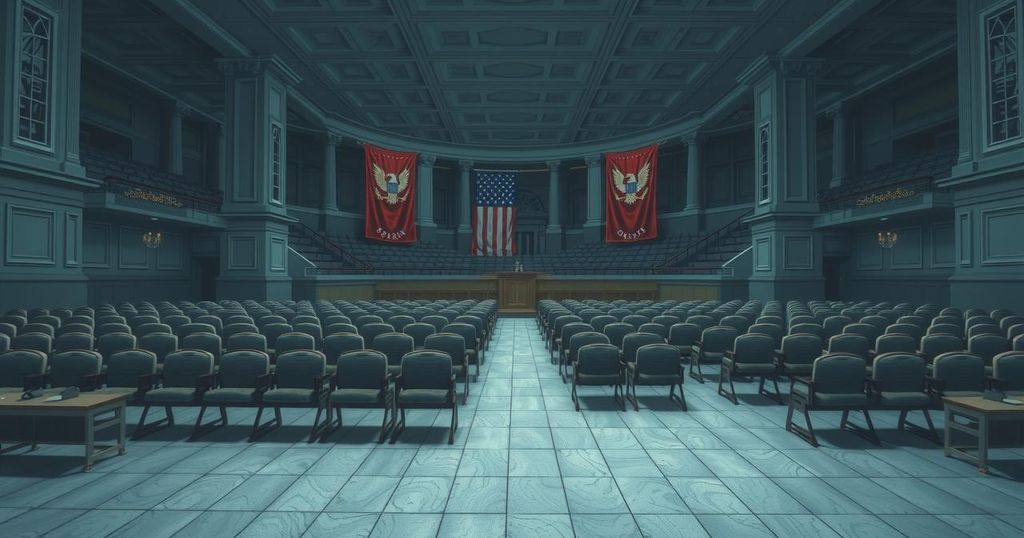Erosion of Nigeria’s Opposition in the House of Representatives: A Democratic Concern

Nigeria’s opposition in the House of Representatives is diminishing in influence and number due to defections and internal strife. The once formidable majority has fragmented, with lawmakers prioritizing personal gain over collective action. This shift poses a significant risk to democracy, as unchecked power could undermine accountability. To remain effective, opposition parties must resolve conflicts and articulate a strong vision for governance.
Historically, the role of opposition in Nigeria’s House of Representatives has been a vocal one, characterized by intense debates and resistance against the ruling party. However, this dynamic is changing, with a marked decline in dissenting voices due to defections and internal conflicts within opposition parties. The ruling All Progressives Congress (APC) previously faced robust opposition, but this is diminishing as political expediency takes precedence over confrontation.
At the outset of the 10th National Assembly in June 2023, opposition parties had a slim majority with 182 seats compared to the APC’s 175. The People’s Democratic Party (PDP) showcased the largest share with 118 seats, followed by the Labour Party (LP) and the New Nigeria Peoples Party (NNPP). This position offered an exceptional chance for opposition influence in policy-making.
However, nearly two years later, the anticipated impact of this majority is fading. The opposition is now losing both numbers and influence due to defections — at least six lawmakers from both the PDP and LP have shifted allegiance to the APC, creating a fragmented and ineffective opposition. Instead of uniting against the government, many lawmakers are prioritizing their political survival, opting for silence and alignment with the ruling party.
The appeal of political patronage has significantly contributed to these defections. The ruling APC’s control over executive resources provides enticing options for lawmakers, incentivizing them to abandon their original parties. Those who remain in opposition risk exclusion from essential decision-making processes, leaving many feeling disillusioned with the fight against the ruling party.
Internal strife within the opposition parties further exacerbates the problem, with the PDP grappling with leadership challenges and factional disputes harming its unity. Similarly, the LP, despite its post-election momentum, has struggled to create the necessary frameworks for member engagement. The lack of a clear agenda makes remaining loyal to these parties less appealing, ultimately leading to increased defections.
The erosion of a strong opposition presents serious implications for democracy. Political analyst Innocent Awuzie warns that without effective opposition, the ruling party could enact legislation without rigorous scrutiny, undermining democratic principles. The absence of checks and balances may allow for unchecked power consolidation, diluting the essence of democracy as a platform for diverse viewpoints.
Awuzie emphasizes that the fallout extends beyond legislative chambers, as defection leads to a loss of voter confidence and grassroots support for opposition parties. He forecasts a troubling future for Nigerian politics, where one-party dominance may prevail if trends continue unchecked.
To regain relevance, opposition parties must resolve internal conflicts, foster party discipline, and articulate a compelling vision for governance. Political analysts urge lawmakers to resist short-term gains in favor of nurturing a vibrant democracy; otherwise, the opposition risks fading into irrelevance, rendering the House of Representatives an extension of the ruling party’s will.
The decline of the opposition in Nigeria’s House of Representatives signifies a troubling trend for democracy. The gradual loss of numbers and influence due to defections, internal conflict, and political patronage threatens the balance of power. Political analysts stress the importance of a strong opposition for maintaining democratic ideals. To remain relevant, the opposition must unite, address internal disputes, and offer a clear vision for governance, or risk becoming obsolete in national discourse.
Original Source: businessday.ng







